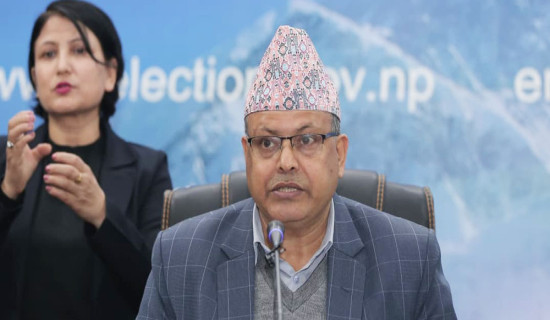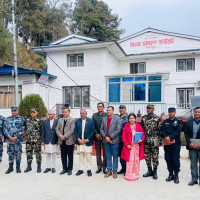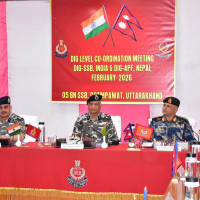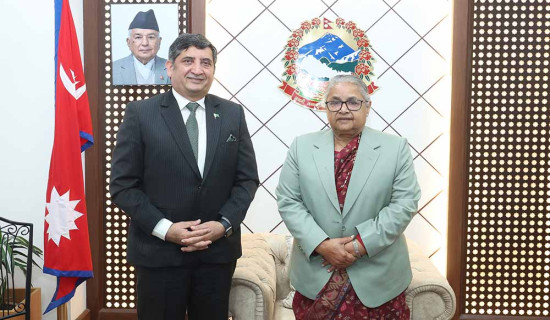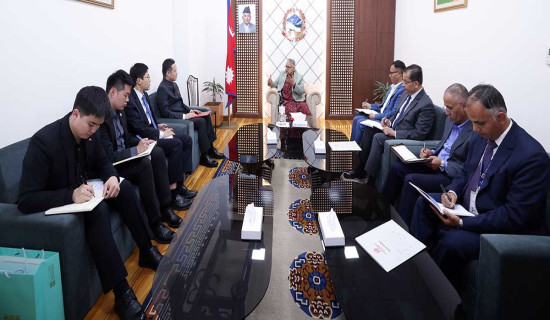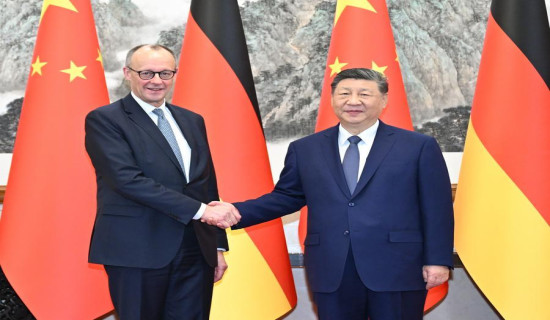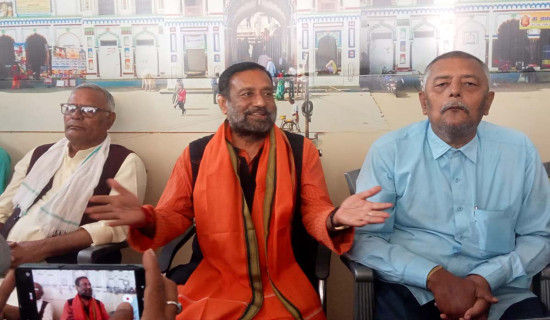- Saturday, 28 February 2026
Time to cooperate for countering misinformation in the face of election
By Narayan Prasad Ghimire, Kathmandu, Sept 27: In a recent tweet, Secretary General of the United Nations, Antonio Guterres (@antonioguterres), said, "Social media platforms based on a business model that monetizes anger and negativity are causing untold damage to societies.
Hate speech and misinformation are proliferating. Our data is being bought and sold to influence behaviour. We need regulatory frameworks to change this." In 18 hours of the tweet, it was retweeted over 1,840 times; tweeted with quotes 342 times, and liked 8,214 times.
One among the tweets with quotes is of Marielza Oliveira (@MarielzaTalks), Director at UNESCO, who wrote, "In early 2023, @UNESCO will bring together stakeholders from governments, private sector, civil society, to discuss what elements regulatory frameworks should address in order to ensure that information is truly a public good and works for democracy."
These two tweets are strong reminders of the day that the digital spheres dominated by social media are run on business models, may cause harm to society, and spread misinformation and hatred, and the time has come to mull how they truly serve democracy with information of public good.
These tweets are relevant in Nepal's present situation because social media are dominant public spheres where a large number of people trade information of different kinds and keep a close watch on government, political leaders/parties, bureaucracy and those conducting public activities. Social media, especially Facebook, Tweeter, YouTube, and TikTok have a tremendous role in Nepal's information ecosystem. They have disrupted the information system the legacy media had developed and stewarded. Growing access of Nepali people to these social media of global presence and dominance should however be studied comprehensively so that it would be easy to ascertain whether social media have contributed to or dented democracy and system.
Undoubtedly, social media have propelled the voices of marginalized and backward people. It has created an unprecedented opportunity for one's exercise of freedom of speech. But, is the information and opinion spread on digital spaces and consumed largely enriched the information ecosystem, thereby enabling citizens' other rights, or fomented the situation, creating 'information disorder'? It has been a global headache as social media have been mis/used to spread misinformation which has badly damaged the reputation of persons, institutions, and systems.
Nepal is poised to hold the election for the House of Representatives and Provincial Assembly coming November 20. It is a significant national political event which must be held in a free, fair and peaceful atmosphere so that it earns credibility. It is the responsibility of many stakeholders, including government, political parties, Election Commission, voters, civil society, media and rights defenders to ensure a fair election by avoiding the spread of fake news: mis/disinformation.
On September 26, the Election Commission secured a commitment from political party leaders in a bid to make the election free, fair and peaceful. They signed in the commitment paper reading that they would abide by the election code of conduct and laws relating to federal and provincial elections and political parties.
When the country witnesses occasions of significant value drawing concern and engagement from a large number of people and institutions, there is a chance of the spread of fake news. An election is evidently such occasion that has mounting political attention, concern and involvement. In addition to a popular democratic exercise, it is a game of win and loss, where political players adopt various measures to secure victory by influencing voters at any cost. Use and misuse of media for political and electoral gains may lead to the sheer spread of misinformation- the spread of false information, and disinformation- the information spread to deceive people.
At a time when we Nepalis have low digital literacy, it is difficult to differentiate between news and disinformation relating to elections. It is a political nature to influence the voters to favour and secure victory. As such, it is not sure all voters consume the right information from the digital public spheres which helps them make the right decision in the election. The use of captivating slogans, incendiary remarks and political stunts seem normal during electioneering, but the fake news spiralled together with these publicity strategies are counterproductive to a healthy information ecosystem. They have a direct contribution to 'information disorder', where uncertainty prevails over the information surrounding a national event like an election, resulting in citizens' wrong choices. Uninformed and dis-informed citizens' decisions and choices obviously damage society as UN Secretary-General suggests.
In a question of how likely there is a chance of fake news on the election in Nepal, the Editor at Nepalcheck.org, Deepak Adhikari, said, "It is right time to discuss thoroughly how the misinformation can be countered because Nepal is holding an election soon." He added, "Globally, there are various examples that fake news sway people during elections, thereby questioning election credibility and eroding democratic values. From creating echo-chamber to spreading political propaganda, voters' data are misused and digital spaces exploited." (RSS)
According to him, Nepalcheck.org has been investigating the mis/disinformation spread on online platforms so that people would not be victims of fake news in the face of the major event as elections.
During the elections, political leaders and candidates make various claims but lack the facts for substantiation. And, the consumers do not have the capacity to judge the veracity of the claims. Once such baseless and intentionally malicious content is spread in an organized and targeted manner over social media, again and again, it is highly like to impact the information consumption of voters. As emotion rather than reason dominates the atmosphere, falsehood grips the people. The emotional and appealing political speeches not only cajole voters but also cause the spread and consumption of fake news.
When wrong information drowns right information, people have no space, and no chance to judge the situation. The time has come for us to create an atmosphere where citizens' right to the right information is ensured. Electoral activities must not be tainted by fake news. In this, especially the political parties, their supporters, Election Commission and National Information Commission have major roles in crate a clean information ecosystem surrounding the election. However, a collaborative approach is imperative to identify and counter fake news so that the election atmosphere would not be polluted. Together, any regulatory measures must not suppress citizens' rights online.



-original-thumb.jpg)


